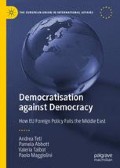Abstract
This chapter uses survey data to analyse perceptions of the EU, its development cooperation programmes, its promotion of democracy, the appropriateness of its response to the Arab Uprisings and the perception of the EU as an international actor. Overall, the data suggests low levels of awareness and relatively negative opinions of the EU’s actions both in general and in the specific context of its response to the Arab Uprisings.
Access this chapter
Tax calculation will be finalised at checkout
Purchases are for personal use only
Notes
- 1.
Source: AT 2014. Notes: USA. Missing values (MVs): Egypt 18.9%, Jordan 3.4%, Morocco 11.3%, Tunisia 17%. Not affect my country: Egypt 3.1%, Jordan 8.8, Morocco 11.1%, Tunisia 16.7%; EU. MVs: Egypt 41.3%, Jordan 7.2%, Morocco 11.1%, Tunisia 18%. Not affect my country: Egypt 11.3%, Jordan 20.3%, Morocco 13.2%, Tunisia 14.7%; Israel. MVs: Egypt 15%, Jordan 2%, Morocco 10.9%, Tunisia 13.5%. Not affect my country: Egypt 1.7%, Jordan 5% Morocco 21.4%, Tunisia 13.7%; Iran. MVs: Egypt 29.8%, Jordan 4.3% Morocco 12.5%, Tunisia 21.7 Not affect my country: Egypt 5.5%, Jordan 4.7%, Morocco 44.6%, Tunisia 33.7%; China. MVs: Egypt 30.7%, Jordan 4.9%, Morocco 12.3, Tunisia 12.9%. Not affect my country: Egypt 12.5%, Jordan 30.9, Morocco, 42.1% Tunisia 33.9; Russia. MVs: Egypt 33.5%, Jordan 6.8%, Morocco 13%, Tunisia 24.4%. Not affect my country: Egypt 7.6%, Jordan 24.5% Morocco 49%, Tunisia 36.9%; Turkey. MVs: Egypt 32.4%, Jordan 5.2%, Morocco 11.8%, Tunisia 17.7%. Not affect my country: Egypt 6.7%, Jordan 5.2% Morocco 43.6%, Tunisia 20.8%; Arab League. MVs: Egypt 28.9, Jordan 5.5%, Morocco 12.8%, Tunisia 18.3%. Not affect my country: Egypt 17.7%, Jordan 34.1%, Morocco 30.3%, Tunisia 28%.
- 2.
We assume for the purpose of this analysis that those who cannot make up their mind (do not know) are in practice seeing the country as neither a force for stability nor for instability overall.
- 3.
Source: ABIV.
- 4.
Source: ABIV.
- 5.
Source: ABIII.
- 6.
Trade agreements are agreed between the EU and partner countries, although trade is bilateral between countries. Concessional loans for public sector infrastructure and to incentivise FDI come from the European Bank for Economic Development and Reconstruction and the European Investment Bank. FDI comes from private individuals and corporations domiciled/registered in an EU Member State, and aid is given both by EU Institutions (from the EU budget) and bilaterally from some EU Member States.
- 7.
Source: ABIV.
- 8.
Source: ABIV 2016. Notes: (1) % neutral. Egypt: EU 22.8%, USA 14.2%, neighbouring countries 27.5%, Russia 20.4%. Jordan: EU 40.6%, USA 34.1%, neighbouring countries 39.1%, Russia 42.5%. Morocco: EU 31.3, USA 30.3, neighbouring countries 39.7%, Russia 45%. Tunisia: EU 24.1%, USA 26.2%, neighbouring countries 22.9%, Russia 40.6%; (2) % missing values. Egypt: EU 28.7%, USA 23.2%, neighbouring countries 23.1%, Russia 27.1%. Jordan: EU 9.0%, USA 8.0%, neighbouring countries 6.3%, Russia 10%. Morocco: EU 20.7, USA 27.8%, neighbouring countries 18.4%, Russia 36.2%. Tunisia: EU 13.6%, USA 14.6, neighbouring countries 7.0%, Russia 29%.
- 9.
Source: ABIII 2013.
- 10.
‘World becoming more connected is a good thing’; ‘Lack of development in Arab world is due to internal factors’; ‘Western interference is an obstacle to reform’; ‘Arab or Islamic countries within your region are an obstacle to reform’.
- 11.
‘Country better off if religious people hold public office’; ‘Religious clerics should have influence over decisions of government’.
- 12.
Source: AT 2014.
References
Datasets
(AB III) Arab Barometer III. Available at: http://www.arabbarometer.org/waves/arab-barometer-wave-iii/.
(AB IV) Arab Barometer IV. Available at: http://www.arabbarometer.org/survey-data/data-downloads/.
(AT) Arab Transformations. Available at: https://abdn.pure.elsevier.com/en/publications/arab-transformations-survey-data.
Other References
Abbott P, Sapsford R, Dìez-Nicloás J, et al. (2017) The Methods Handbook for the Political and Social Transformations in the Arab World Project. Aberdeen: University of Aberdeen. Available at: https://www.researchgate.net/publication/316553391_The_Methods_Handbook_for_the_Political_and_Social_Transformations_in_the_Arab_World_Project.
Cebeci M (2019) Problematizing Effectiveness and Potential of EU Policies in the Mediterranean. Rome: MEDRESET. Available at: http://www.medreset.eu/wp-content/uploads/2019/04/medreset_pp_8.pdf.
European Commission (2013) European Neighbourhood Policy. Working Towards a Stronger Partnership. JOIN(2013) 4 final. Brussels: European Commission. Available at: www.epgencms.europarl.europa.eu/cmsdata/upload/2a9f8c0d-5229-4304-8880-2507503cd005/EaP_2013_comm_conjoint_en.pdf.
European Commission (2015) Towards a New European Neighbourhood Policy. SWD(2015) 500 final. Brussels: European Commission. Available at: http://eeas.europa.eu/archives/docs/enp/documents/2015/151118_joint-communication_review-of-the-enp_en.pdf.
European Council (2015) Council Conclusions on Review of the European Neighbourhood Policy. Press Release 14/12/2015. Brussels: European Council. Available at: https://www.consilium.europa.eu/en/press/press-releases/2015/12/14/conclusions-european-neighbourhood/.
Hashemi N (2013) The Arab Spring Two Years On: Reflections on Dignity, Democracy and Devotion. Ethics and International Affairs 27(2): 207–221. Available at: https://www.cambridge.org/core/journals/ethics-and-international-affairs/article/arab-spring-two-years-on-reflections-on-dignity-democracy-and-devotion/6BC2A69053390A38AB73343F7A8AE930.
Huber D, Nouira A and Paciello MC (2018) The Mediterranean: A Space of Division, Disparity and Separation. Rome: MEDRESET. Available at: https://www.iai.it/en/pubblicazioni/mediterranean-space-division-disparity-and-separation.
Schulmiester P, Defourny E and Maggio L (2018) Delivering on Europe: Citizen’s Views on Current and Future EU Action. Brussels: European Parliament. Available at: http://www.europarl.europa.eu/at-your-service/files/be-heard/eurobarometer/2018/delivering_on_europe_citizens_views_on_current_and_future_eu_action/report.pdf.
Author information
Authors and Affiliations
Corresponding author
Rights and permissions
Copyright information
© 2020 The Author(s)
About this chapter
Cite this chapter
Teti, A., Abbott, P., Talbot, V., Maggiolini, P. (2020). In the Eye of the Beholder: Perceptions of the EU Through Survey Data. In: Democratisation against Democracy. The European Union in International Affairs. Palgrave Macmillan, Cham. https://doi.org/10.1007/978-3-030-33883-1_9
Download citation
DOI: https://doi.org/10.1007/978-3-030-33883-1_9
Published:
Publisher Name: Palgrave Macmillan, Cham
Print ISBN: 978-3-030-33882-4
Online ISBN: 978-3-030-33883-1
eBook Packages: Political Science and International StudiesPolitical Science and International Studies (R0)

